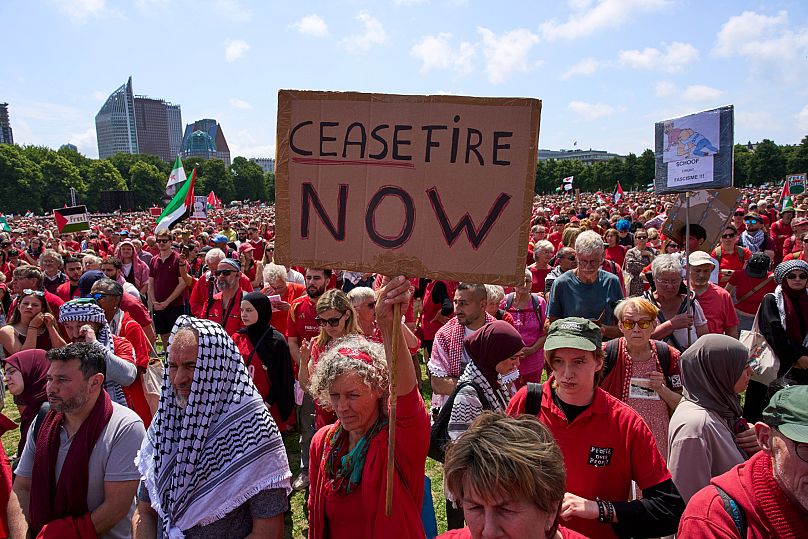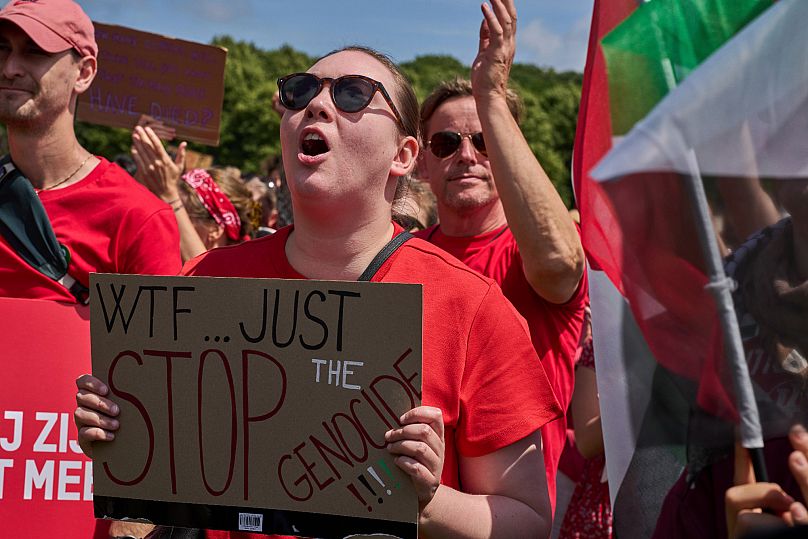Tens of thousands of demonstrators in The Hague donned red clothing and marched to protest the Dutch government’s policy toward Israel on Sunday.
It was the second time the so-called "Red Line protest" took place in the Dutch political capital, exceeding the turnout for a similar event in May.
Protesters walked a 5-kilometre loop around the centre of The Hague to symbolically create the red line they say the government has failed to draw to halt Israel’s campaign in Gaza.
The human rights groups and aid agencies — including Amnesty International, Save the Children and Doctors Without Borders — that organised the march estimated the peaceful crowd at more than 150,000 people. Local media put the numbers closer to 100,000.
“I don’t want to be complicit in these horrendous crimes happening there and I want to speak out,” said protester Marin Koning.
In neighbouring Belgium, at least 75,000 people, many of them also clad in red, hit the streets in the capital Brussels, police said. Organisers estimated the crowd at 110,000.
Several rallies have been held to draw attention to Israel's actions in Gaza, but Sunday's was the biggest rally so far.

The Dutch protest sent a “clear signal,” according to Marjon Rozema of Amnesty International Netherlands. Dutch officials must “act now, at both the national and international level, to increase the pressure on the Israeli government,” she said in a statement.
Outgoing Prime Minister Dick Schoof responded to the protest in a post on X. "We see you and we hear you," he wrote, adding that "our eventual goal is the same: to bring an end as soon as possible to the suffering in Gaza."
As during the first Red Line protest in May, the march took the crowds past the Peace Palace, headquarters of the United Nations’ International Court of Justice, where last year judges ordered Israel to do all it can to prevent death, destruction and any acts of genocide in Gaza.
Israel strongly denies that it is violating international law in Gaza.
Several UN agencies and other humanitarian organisations have accused Israel of committing crimes against humanity against Palestinians in Gaza, including ethnic cleansing.

Experts at the UN Independent International Commission of Inquiry on the Occupied Palestinian Territory said in a report this week that Israel committed the crime against humanity of "extermination" by killing civilians sheltering in schools and religious sites.
Amnesty International concluded that Israel is committing genocide against Palestinians in Gaza in a report published in December.
The war began when Hamas militants attacked southern Israel on 7 October 2023, killing around 1,200 people, most of them civilians. Hamas took 251 people as hostages, and is currently holding 53 of them, fewer than half of them alive, after most of the rest were released in ceasefire agreements or other deals.
A subsequent Israeli offensive has to date killed more than 55,300 Palestinians, mostly women and children, according to the Hamas-run Gaza Health Ministry whose figure does not distinguish between fighters and civilians. The figures are repeatedly cited by international institutions, such as the UN.







